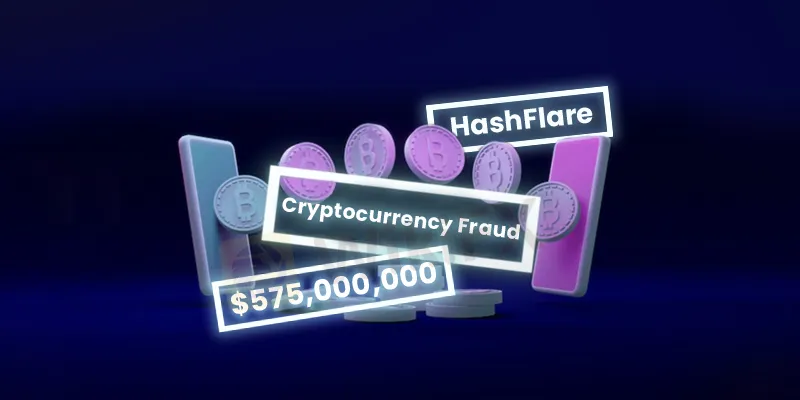简体中文
繁體中文
English
Pусский
日本語
ภาษาไทย
Tiếng Việt
Bahasa Indonesia
Español
हिन्दी
Filippiiniläinen
Français
Deutsch
Português
Türkçe
한국어
العربية
Two Estonian Citizens Arrested! A $575 Million Crypto Currency Scam Exposed
Abstract:November 20, 2022, two Estonian were arrested for their alleged involvement in a series of cryptocurrency and money laundering scams.

According to preliminary statistics, the scammers took $575 million from “hundreds of thousands of victims,” while the suspects used their ill-gotten gains to buy real estate and luxury cars.
The arrests of the two Estonian citizens, Sergei Potapenko and Ivan Turõgin, both 37, were reportedly made in Tallinn, Estonia, following a joint investigation by U.S. and Estonian law enforcement authorities. The suspects are accused of defrauding hundreds of thousands of victims between December 2013 and August 2019, along with four other associates living in Estonia, Belarus, and Switzerland.
“The size and scope of the alleged scheme is truly astounding. ” said U.S. Attorney Nick Brown for the Western District of Washington. “These defendants capitalized on both the allure of cryptocurrency, and the mystery surrounding cryptocurrency mining, to commit an enormous Ponzi scheme.”
The amount involved is huge and there are many victims
The two individuals are known to have been running a series of scams through a fake cryptocurrency mining service called HashFlare, and a company called Polybius.
Potapenko and Turõgin have signed contracts with customers that allow them to rent HashFlare's mining operations in exchange for cryptocurrency. HashFlare's website enables customers to see the amount of cryptocurrency their mining activity should generate. But in reality these cryptocurrency mining devices are not even mining at one percent of the rate promised by HashFlare. Over $550 million worth of HashFlare contracts were signed by customers around the world between 2015 and 2019.
In May 2017, Potapenko and Turõgin invested in a company called Polybius, promising to set up a bank engaged in the business of cryptocurrency, dividing the profits of the company to investors, and raised at least $ 25 million with this plan. However, the bank has never been established, nor has it paid any dividends.
According to the document, Potapenko and Turõgin are also charged with money laundering.
Currently, the FBI is investigating this case, and the two scammers have been charged with 16 counts of wire fraud and one count of conspiracy to commit money laundering. If convicted, the two men face up to 20 years in prison.

Disclaimer:
The views in this article only represent the author's personal views, and do not constitute investment advice on this platform. This platform does not guarantee the accuracy, completeness and timeliness of the information in the article, and will not be liable for any loss caused by the use of or reliance on the information in the article.
Read more

Doo Financial Expands Regulatory Reach with Offshore Licenses in BVI and Cayman Islands
According to the report, Doo Group, a prominent Singapore-based online brokerage firm, has strengthened its global presence by securing new offshore licenses for its brokerage brand, Doo Financial. The company recently announced that entities under the Doo Financial umbrella have been granted licenses by two key offshore regulatory bodies: the British Virgin Islands Financial Services Commission (BVI FSC) and the Cayman Islands Monetary Authority (CIMA).

Russia to Fully Ban Crypto Mining in 10 Regions Starting January 1, 2025
Starting from January 1, 2025, Russia will implement a comprehensive ban on cryptocurrency mining in 10 regions for a period of six years. The ban will remain in effect until March 15, 2031.

Why is there so much exposure against PrimeX Capital?
In recent months, PrimeX Capital, a Forex and CFD broker established in 2022, has become a subject of concern in the trading community. However, despite these enticing features, the broker's reputation has been severely tarnished by multiple complaints and a troubling lack of regulatory oversight.

The Hidden Checklist: Five Unconventional Steps to Vet Your Broker
Forex broker scams continue to evolve, employing new tactics to appear credible and mislead unsuspecting traders. Identifying these fraudulent schemes requires vigilance and strategies beyond the usual advice. Here are five effective methods to help traders assess the legitimacy of a forex broker and avoid potential pitfalls.
WikiFX Broker
Latest News
ASIC Sues Binance Australia Derivatives for Misclassifying Retail Clients
AIMS Broker Review
The Hidden Checklist: Five Unconventional Steps to Vet Your Broker
WikiFX Review: Is FxPro Reliable?
Malaysian-Thai Fraud Syndicate Dismantled, Millions in Losses Reported
Trading frauds topped the list of scams in India- Report Reveals
YAMARKETS' Jingle Bells Christmas Offer!
Doo Financial Expands Regulatory Reach with Offshore Licenses in BVI and Cayman Islands
Why is there so much exposure against PrimeX Capital?
Russia to Fully Ban Crypto Mining in 10 Regions Starting January 1, 2025
Currency Calculator


